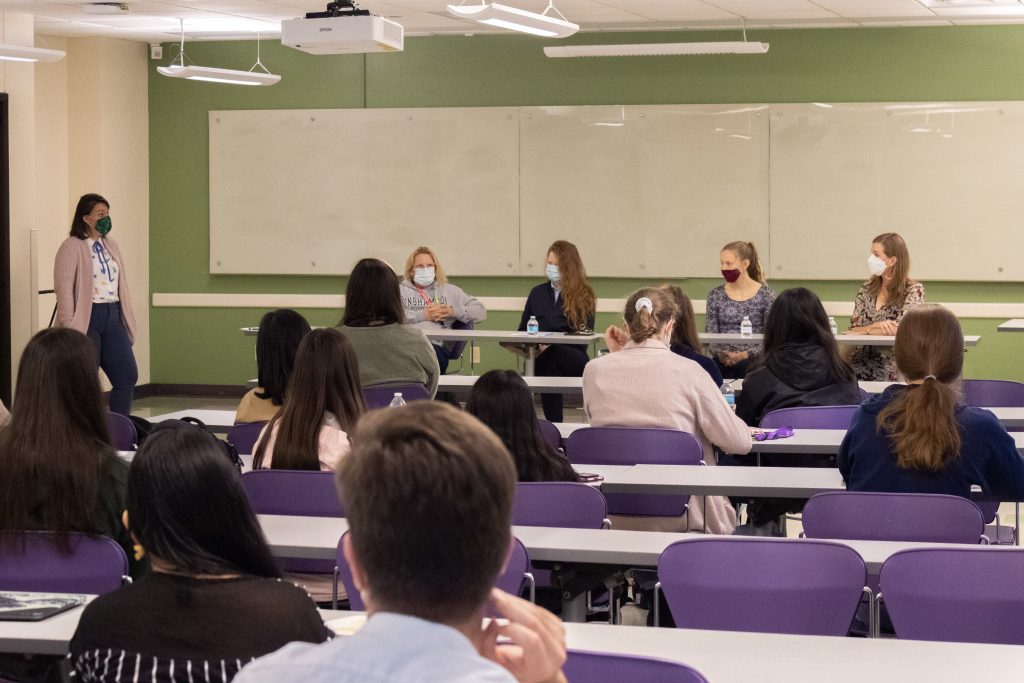The External Scholarships and Undergraduate Research Center at Binghamton University held a panel discussion on Wednesday, sparking a conversation about gender equity and inclusion in different fields of research.
The event, titled “Women in Research Roundtable,” highlighted four panelists, consisting of BU professors as well as undergraduate and graduate students. Each of these women discussed their passions and experiences in research, answering questions posed by Vanessa Jaeger, the assistant director of the Center. The Center’s goal is to help students get involved with research and apply for scholarships and fellowships. Valerie Imbruce, the director of the Center, hoped the event would bring to light the differences in treatment of and respect for women in professional careers.
“Women tend to do more service in their institutions than men,” Imbruce said. “And those tasks are not as appreciated nor become the basis for tenure or promotion.”
The Center’s staff members have worked on the event since the end of August, according to Cassidy Philip, one of the undergraduate research ambassadors and an undeclared sophomore. Jaeger, while explaining what motivated them to hold the event, told a female student’s story about a bullying incident she experienced while working on an independent research project.
“Apparently these students were telling people there was no way she could have come up with the idea herself, because how could a woman ever produce work that academically rigorous?” Jaeger said.
Jaeger also described another student’s imposter syndrome as a woman in research. By holding the panel, Jaeger said she hoped to open the conversation up to a larger audience so that young women understand that they are not alone in going through these feelings.
“If we aren’t having the conversation and acknowledging that these issues affect our faculty and our students across all disciplines, then how can we ever hope to create some sort of awareness or change on campus?” Jaeger said.
Jaeger commenced the discussion by asking the four panelists about their fields. Each panelist provided a brief overview of their current research undertakings then proceeded to discuss the varying levels of sexism they encountered from their peers and their mentors.
Julia Walker, director of undergraduate studies for art history, associate professor of art history and associate director of the Institute for Advanced Studies in the Humanities, expressed her excitement and worry when younger women interested in her field approach her, and remembered how difficult it was to get the same level of training for the job market compared to men in the field.
“It was discouraging to me how much emphasis was placed on how I presented myself,” Walker said. “How much I smiled and even my voice modulation seemed to be up for judgment.”
Another panelist, Susan Bane, a professor of chemistry and biochemistry program director, recounted an earlier period of her career when she was the only woman in her department, and how much harder she had to work in order to prove herself among her male colleagues.
“You can be male and mediocre,” Bane said. “But you can’t be female and be mediocre.”
Mary Campbell, a junior double-majoring in English and biology who has endured digitalized, sexist attacks, emphasized the importance of speaking out against wrongdoings and said it helps women find a sense of community. Campbell said she hopes to inspire women to pursue education and research in any field they desire.
“What most excited me was the ability to illuminate the problems that women are facing because a lot of us go through it alone,” Campbell said.
Jacqueline Frazer, the fourth panelist, a sociology graduate student and Writing 111: Inquiry and Academic Writing instructor, briefly described a negative experience she had with a male adviser. When asked to advise the audience members about how to handle a similar situation, Frazer’s answer was similar to Campbell’s, urging them to demand equity.
Emily Wheelis, a junior majoring in integrative neuroscience, said she hopes to enter a field of research herself. Wheelis attended the event and said despite how far women have come, sexism in research and the workforce is an ongoing issue.
“Women really do have to prove themselves 10 times over before they are as respected as men are,” Wheelis said.
Toward the end of the event, audience members were invited to ask questions or tell their own stories. Walker said she found the Q & A session insightful.
“For me, the best part was listening to the thoughtful, smart and compassionate questions and comments from the students in the room, both those on the panel and those in the audience,” Walker said.
Guests posed questions about the refusal to address female professors with their correct title and the differences in student evaluation of male versus female professors.
The Center has planned another similar event, called “LGBTQIA+ Identities in Research,” to further these important conversations. It will be held on Nov. 16 from 4:00 p.m. to 5:30 p.m.
“Our office is really pleased by how the discussion went and we’re hoping to keep the momentum of that success moving forward,” Jaeger said. “Hopefully these conversations can bring the [BU] community together a bit more and we can work together, rather than separately, to start addressing issues of equality and inclusion at all levels.”



